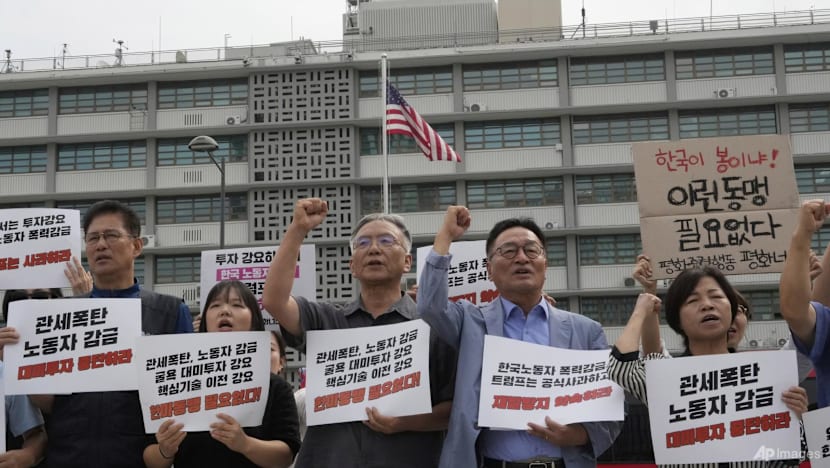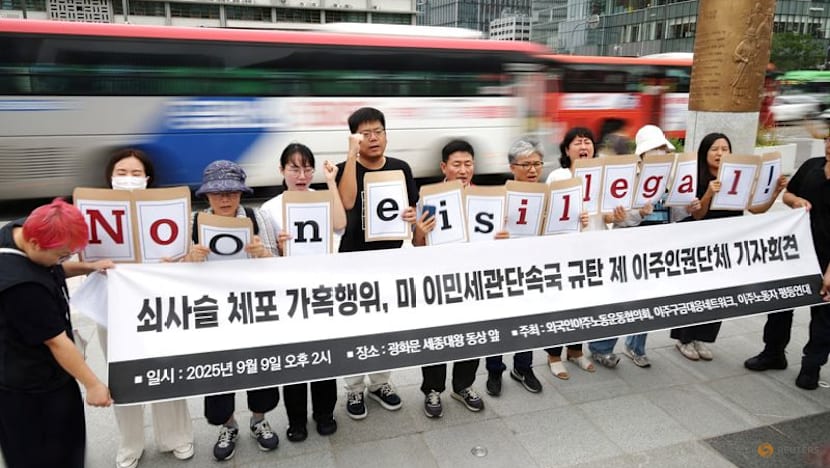South Korea to send plane for workers detained in US raid at car battery plant

Protesters stage a rally against the detention of South Korean workers during an immigration raid in Georgia, near the U.S. Embassy in Seoul, South Korea, on Sep 9, 2025. (Photo: AP/Ahn Young-joon)
SEOUL: South Korea will send a chartered plane to Atlanta as early as Wednesday (Sep 10) to bring back workers detained in a huge immigration raid last week on a car battery plant in the US state of Georgia, a Korean Air spokesperson said on Tuesday.
The workers will depart the US at around 2.30pm local time on Wednesday (Thursday, 2.30am, Singapore time), Yonhap news agency said on Wednesday morning, citing an unnamed diplomatic source.
South Korea's foreign ministry did not immediately respond to a request for comment.
President Lee Jae Myung said Seoul would negotiate with Washington to achieve a reasonable resolution to the situation based on the spirit of their alliance, adding at a cabinet meeting that he felt a "heavy responsibility" for the detained nationals.
A Korean Air Boeing 747-8i plane with 368 seats will fly from South Korea's Incheon to Atlanta, according to the spokesperson. During the US immigration raid about 300 South Koreans were arrested along with 175 others at the site of the US$4.3 billion Hyundai Motor and LG Energy Solution project to build batteries for electric cars.
South Korean Foreign Minister Cho Hyun is in Washington to negotiate on points such as seeking assurances that the Koreans returned home will be allowed to re-enter the United States.
White House spokeswoman Karoline Leavitt referred questions to the US Department of Homeland Security and the US Department of Commerce, saying they were handling the matter.
Assistant DHS Secretary Tricia McLaughlin, in a statement, gave no details on the ongoing probe or talks but defended the raid: "Those who exploit our workforce, undermine our economy, and violate federal laws will be held accountable.”
Representatives for Commerce could not be immediately reached.
Over the weekend, US President Donald Trump said foreign companies must hire and train American workers while respecting immigration laws.

"Americans need these jobs. But he also understands the need for these companies to bring over their workers who already have these skills," Leavitt told reporters at a briefing, calling Trump's approach "very nuanced and responsible and sensible."
The raid - the largest single-site enforcement operation in the history of the Department of Homeland Security's investigative operations - sent shockwaves through South Korea, a US ally that has been trying to finalise a trade deal agreed with Washington in July.
A Realmeter opinion poll published on Tuesday showed that nearly 60 per cent of South Koreans felt disappointed by what they viewed as excessive action by US authorities in the raid, while about 30 per cent regarded the action as unavoidable. Two Japanese nationals and up to nine Chinese citizens were among the detainees, the Nikkei business daily reported.
Details on how US immigration rules may have been breached have not been released by the authorities or companies involved, but South Korean lawmakers say some may have overstepped the boundaries of a 90-day visa-waiver programme or a B-1 temporary business visa.
Foreign Minister Cho said he would discuss with Washington creating a special work permit for Korean professionals.
Korean businesses have complained about what they consider strict US limits on visas for skilled foreign workers, making it difficult for them to oversee the construction of factories or to train the local workforce.
According to workers, officials and lawyers, many South Korean workers were sent to the US on questionable documents despite their misgivings and warnings about stricter US immigration enforcement.
James Rim, who heads the Korean-American Association of Southeast Georgia and runs guesthouses used by Korean workers near the Hyundai plant, said two of his residents were detained after being found to be on a visa-waiver programme that prohibits employment in the country while two others returned after screening during the raid.
Some of the 20 subcontractors working at the plant and staying at his guesthouse had returned to South Korea early, he said after the raid, adding that some of the workers were on a visa waiver, which had long been a standard practice.
"It should have been done earlier, but I think now is a good chance to give some kind of a special work permit to Koreans. Otherwise, it would be difficult to build factories only with a local workforce," he said.
Korean businesses have complained about what they consider strict US limits on visas for skilled foreign workers, making it difficult for them to oversee the construction of factories or to train the local workforce. According to workers, officials and lawyers, many South Korean workers were sent to the US on questionable documents despite their misgivings and warnings about stricter US immigration enforcement.
After the raid, Rim said some of the 20 subcontractors working at the plant and also staying at his guesthouse had returned to South Korea early.
"Not everyone, but some of the workers came here on a visa waiver," Rim said, adding that this had long been a standard practice.
"It should have been done earlier but I think now is a good chance to give some kind of a special work permit to Koreans. Otherwise, it would be difficult to build factories only with a local workforce," he said.















